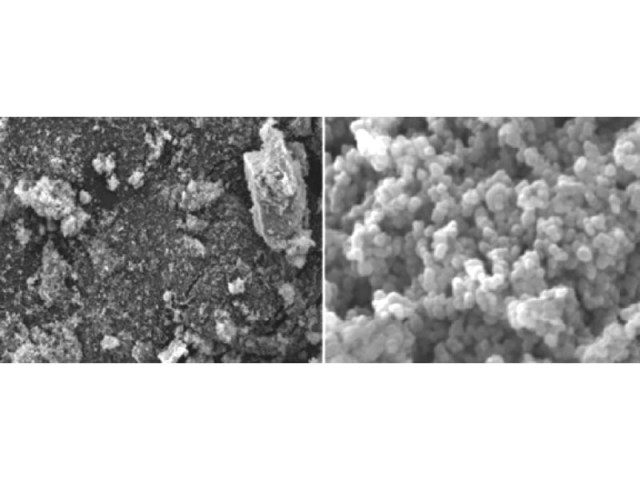Power of Silver titanium dioxide: Hospitals that disinfects themselves might become a reality
Research on TiO2 nanoparticles for enhanced sanitisation opens new paths for future hygiene.

The finished project is a coating that can be applied like paint on various surfaces. PHOTO: FILE
Imagine a hospital that could disinfect itself. Life would be easier for janitors, and the risk of infections spreading from surfaces accidentally left unclean would be reduced. All this now can be a reality.
Saman Khan of the National University of Sciences and Technology (NUST) has carried out a research work using Titanium Dioxide (TiO2) nanoparticles to develop a sheet that when applied to different surfaces kills bacteria which come in contact with it.
“It’s a simple coating that is self-sanitising,” she said. “The bacteria that touch it are automatically degraded and destroyed.”
The coating works on the principal of photo catalysis. When exposed to ultraviolet rays, the TiO2 nanoparticles — particles as small as a billionth of a meter— generate highly reactive free ions which are capable of destroying the cells of the microbes that touch it.
When TiO2 is mixed with a small amount of metal — Silver, in Khan’s case — it also acts as a photo catalyst in the visible light range.
The finished project is a coating that can be applied like paint on various surfaces. It can also be formed into a sheet that can be wrapped around surfaces.
In the research paper Khan wrote with four other NUST researchers, the coating was tested against two common types of bacteria: Pseudomonas aeruginosa and Bacillus subtilis.
Both are linked with causing diseases in severely immune-compromised patients, hence they are critical to infections that arise due to lack of proper medical hygiene.
“Sanitation is a basic issue, for example, according to some studies, 40 per cent of diseases that spread through hospitals are because of unhygienic conditions,” Khan said.
Khan’s research experiments showed that under normal light, the coating almost completely decontaminated bacterial culture in around 120 minutes.
In the experiments, the coating was applied on glass and venetian blinds. But Khan, who did her master’s in environmental sciences, said it could be used in tiles, table tops at restaurants and house kitchens.
The whiteness of TiO2 — it is used as a pigment in paint — and its lack of toxicity lend to its convenience in coating surfaces, she said.
Khan’s research project, which was funded by the NUST, has already won her third place worth $5,000 at the Global Innovation through Science and Technology (GIST) Tech-I competition in 2012 and the research paper she co-wrote has been accepted for the Journal of nanomaterials, an open-sourced, peer-reviewed journal.
But most importantly, Khan said, she is in talks with a couple of local pharma companies to translate the lab-tested technology to practical use.
Published in The Express Tribune, February 27th, 2013.



















COMMENTS
Comments are moderated and generally will be posted if they are on-topic and not abusive.
For more information, please see our Comments FAQ